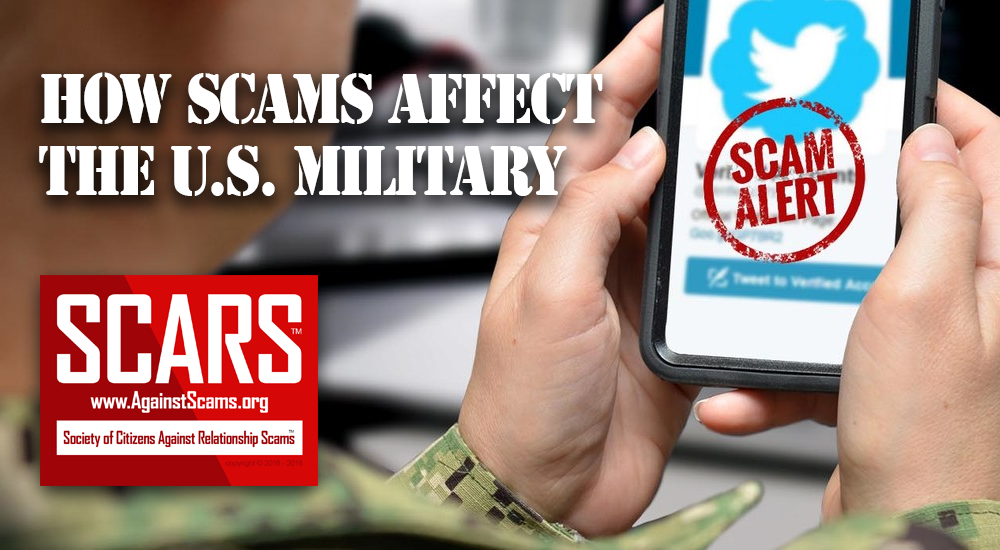
SCARS Institute’s Encyclopedia of Scams™ Published Continuously for 25 Years

SCARS™ Special Report: How Social Media Scams Are Affecting The U.S. Military
You Have To Be Cautious About Everything You Do Online!
Scammers are always trying to get money, goods or services out of unsuspecting people — and military members are often targets.
[lwptoc]
Here are some scams that have recently been affecting service members, Defense Department employees and their families.
Romance Scams
In April, Army Criminal Investigation Command put out a warning about romance scams in which online predators go on dating sites claiming to be deployed active-duty soldiers. It’s a problem that’s affecting all branches of service — not just the Army.
U.S. Army CID said “there have been hundreds of claims each month from people who said they’ve been scammed on legitimate dating apps and social media sites. According to the alleged victims, the scammers have asked for money for fake service-related needs such as transportation, communications fees, processing and medical fees — even marriage.”
CID said “many of the victims have lost tens of thousands of dollars and likely won’t get that money back.”
Remember: Service members and government employees DO NOT PAY to go on leave, have their personal effects sent home or fly back to the U.S. from an overseas assignment. Scammers will sometimes provide false paperwork to make their case, but real service members make their own requests for time off. Also, any official military or government emails will end in .mil or .gov — not .com — so be suspicious if you get a message claiming to be from the military or government that doesn’t have one of those addresses.
If you’re worried about being scammed, know what red flags to look for. If you think you’ve been a victim, contact the FBI Internet Crime Complaint Center and the Federal Trade Commission.
U.S. Department of Defense [DOD] officials said “task forces are working to deal with the growing problem, but the scammers are often from African nations and are using cyber cafes with untraceable email addresses, then routing their accounts across the world to make them incredibly difficult to trace. So be vigilant!”
Sextortion
Sexual extortion — known as “sextortion” — is when a service member is seduced into sexual activities online that are unknowingly recorded and used against them for money or goods. Often, if a victim caves on a demand, the scammer will just likely demand more.
Service members are attractive targets for these scammers for a few reasons:
- They’re often young men who are away from home and have an online presence.
- They have a steady income and are often more financially stable than civilians.
- Because of their careers, they’re held to a higher standard of conduct.
- Military members have security clearances and know things that might be of interest to adversaries.
To avoid falling victim to sextortion, don’t post or exchange compromising photos or videos with ANYONE online, and make sure your social media privacy settings limit the information outsiders can see — this includes advertising your affiliation with the military or government. Be careful when you’re communicating with anyone you don’t personally know online, and trust your instincts.
IF PEOPLE SEEM SUSPICIOUS, STOP COMMUNICATING WITH THEM.
DOD officials said “sextortion often goes unreported because many victims are embarrassed they fell for it. But it happens worldwide and across all ranks and services.”
Here’s what you should do about it if it happens to you:
- Stop communicating with the scammer.
- Contact your police and your local CID office if you are in the Army.
- Do NOT pay the perpetrator.
- Save all communications you had with that person.
- Report the scam on www.Anyscam.com or here on this website (see menu).
Service Member Impersonation Scams
Scammers love to impersonate people of authority, and that includes service members.
These people often steal the identity or profile images of a service member and use them to ask for money or make claims that involve the sale of vehicles, house rentals or other big-ticket items.
These scammers often send the victim bogus information about the advertised product and ask for a wire transfer through a third party to finish the purchase, but there’s no product at the end of the transaction.
For years, fake profiles of high-ranking American military officials have been popping up on social media websites using photos and biographical information obtained from the internet.
Scammers often replicate recent social media posts from official DOD or Military Personnel accounts and interact with official accounts to increase the appearance of legitimacy. As an example, there are impersonator accounts on Facebook, Instagram and Twitter for Marine Corps Gen. Joe Dunford, the chairman of the Joint Chiefs of Staff. These accounts are also interacting with Joint Staff account followers in an effort to gain trust and elicit information.
The only Joint Staff leader with an official social media presence is Senior Enlisted Advisor to the Chairman Army Command Sgt. Maj. John Wayne Troxell, who is listed as @SEAC.JCSon Facebook and @SEAC_Troxell on Twitter.
Scammers are making these profiles in the millions to defraud potential victims.
They claim to be high-ranking or well-placed government/military officials or the surviving spouse of former government leaders, then they promise big profits in exchange for help in moving large sums of money, oil or some other commodity. They offer to transfer significant amounts of money into the victim’s bank account in exchange for a small fee. Scammers that receive payment are never heard from again.
Here are some ways to lower the chances of you being impersonated or duped by a scammer:
- To avoid having your personal data and photos stolen from your social media pages, limit the details you provide on them and don’t post photos that include your name tag, unit patch and rank.
- If an alleged official messages you with a request or demand, look closely at their social media page. Often, official accounts will be verified, meaning they have a blue circle with a checkmark right beside their Twitter, Facebook or Instagram name. General and flag officers will not message anyone directly requesting to connect or asking for money.
- If you are Military or Ex-Military search for yourself online — both your name and images you’ve posted — to see if someone else is trying to use your identity.
- If you do find a false profile, contact that social media platform and report it and also report it on www.Anyscam.com which lets the world know you have been impersonated.
PLEASE SHARE OUR ARTICLES WITH YOUR CONTACTS
HELP OTHERS STAY SAFE ONLINE
SCARS™ Team
A SCARS Division
Miami Florida U.S.A.
TAGS: SCARS, Important Article, Information About Scams, Anti-Scam, Scams Affect The U.S. Military, Military Scam Victims, Fake Soldiers, Military Impersonation Scams, United States Military
The Latest SCARS|RSN Posts
FIND MORE SCAM NEWS
«SCAMCRIME.COM»
CHAT WITH SCARS™
«CLICK HERE»
END
MORE INFORMATION
– – –
Tell us about your experiences with Romance Scammers in our
« Scams Discussion Forum on Facebook »
– – –
FAQ: How Do You Properly Report Scammers?
It is essential that law enforcement knows about scams & scammers, even though there is nothing (in most cases) that they can do.
Always report scams involving money lost or where you received money to:
- Local Police – ask them to take an “informational” police report – say you need it for your insurance
- Your National Police or FBI « www.IC3.gov »
- The SCARS|CDN™ Cybercriminal Data Network – Worldwide Reporting Network « HERE » or on « www.Anyscam.com »
This helps your government understand the problem, and allows law enforcement to add scammers on watch lists worldwide.
– – –
Visit our NEW Main SCARS Facebook page for much more information about scams and online crime: « www.facebook.com/SCARS.News.And.Information »
To learn more about SCARS visit « www.AgainstScams.org »
Please be sure to report all scammers
« HERE » or on « www.Anyscam.com »
Legal Notices:
All original content is Copyright © 1991 – 2020 SCARS All Rights Reserved Worldwide & Webwide. Third-party copyrights acknowledge.
SCARS, RSN, Romance Scams Now, SCARS|WORLDWIDE, SCARS|GLOBAL, SCARS, Society of Citizens Against Relationship Scams, Society of Citizens Against Romance Scams, SCARS|ANYSCAM, Project Anyscam, Anyscam, SCARS|GOFCH, GOFCH, SCARS|CHINA, SCARS|CDN, SCARS|UK, SCARS Cybercriminal Data Network, Cobalt Alert, Scam Victims Support Group, are all trademarks of Society of Citizens Against Relationship Scams Incorporated.
Contact the law firm for the Society of Citizens Against Relationship Scams Incorporated by email at legal@AgainstScams.org
-/ 30 /-
What do you think about this?
Please share your thoughts in a comment below!
Table of Contents
- You Have To Be Cautious About Everything You Do Online!
- Romance Scams
- Sextortion
- Service Member Impersonation Scams
- The Latest SCARS|RSN Posts
- Fake Money Recovery Law Firms – 2026
- Money Laundering Drop Accounts – 2026
- 7 Deadly Sins of Post Scam Victim Vulnerability – 2023 UPDATED 2026
- United States Scam Center Strike Force – 2025 – VIDEO
- The Scam States of Southeast Asia – 2025-2026
- Yangyang Sweet / 阳阳 Sweet – Impersonation Victim – Used By Scammers – 2025
LEAVE A COMMENT?
Thank you for your comment. You may receive an email to follow up. We never share your data with marketers.
Recent Comments
On Other Articles
- on Love Bombing And How Romance Scam Victims Are Forced To Feel: “I was love bombed to the point that I would do just about anything for the scammer(s). I was told…” Feb 11, 14:24
- on Dani Daniels (Kira Lee Orsag): Another Scammer’s Favorite: “You provide a valuable service! I wish more people knew about it!” Feb 10, 15:05
- on Danielle Delaunay/Danielle Genevieve – Stolen Identity/Stolen Photos – Impersonation Victim UPDATED 2024: “We highly recommend that you simply turn away form the scam and scammers, and focus on the development of a…” Feb 4, 19:47
- on The Art Of Deception: The Fundamental Principals Of Successful Deceptions – 2024: “I experienced many of the deceptive tactics that romance scammers use. I was told various stories of hardship and why…” Feb 4, 15:27
- on Danielle Delaunay/Danielle Genevieve – Stolen Identity/Stolen Photos – Impersonation Victim UPDATED 2024: “Yes, I’m in that exact situation also. “Danielle” has seriously scammed me for 3 years now. “She” (he) doesn’t know…” Feb 4, 14:58
- on An Essay on Justice and Money Recovery – 2026: “you are so right I accidentally clicked on online justice I signed an agreement for 12k upfront but cd only…” Feb 3, 08:16
- on The SCARS Institute Top 50 Celebrity Impersonation Scams – 2025: “Quora has had visits from scammers pretending to be Keanu Reeves and Paul McCartney in 2025 and 2026.” Jan 27, 17:45
- on Scam Victims Should Limit Their Exposure To Scam News & Scammer Photos: “I used to look at scammers photos all the time; however, I don’t feel the need to do it anymore.…” Jan 26, 23:19
- on After A Scam, No One Can Tell You How You Will React: “This article was very informative, my scams happened 5 years ago; however, l do remember several of those emotions and/or…” Jan 23, 17:17
- on Situational Awareness and How Trauma Makes Scam Victims Less Safe – 2024: “I need to be more observant and I am practicing situational awareness. I’m saving this article to remind me of…” Jan 21, 22:55
ARTICLE META
Important Information for New Scam Victims
- Please visit www.ScamVictimsSupport.org – a SCARS Website for New Scam Victims & Sextortion Victims
- Enroll in FREE SCARS Scam Survivor’s School now at www.SCARSeducation.org
- Please visit www.ScamPsychology.org – to more fully understand the psychological concepts involved in scams and scam victim recovery
If you are looking for local trauma counselors please visit counseling.AgainstScams.org or join SCARS for our counseling/therapy benefit: membership.AgainstScams.org
If you need to speak with someone now, you can dial 988 or find phone numbers for crisis hotlines all around the world here: www.opencounseling.com/suicide-hotlines
A Note About Labeling!
We often use the term ‘scam victim’ in our articles, but this is a convenience to help those searching for information in search engines like Google. It is just a convenience and has no deeper meaning. If you have come through such an experience, YOU are a Survivor! It was not your fault. You are not alone! Axios!
A Question of Trust
At the SCARS Institute, we invite you to do your own research on the topics we speak about and publish, Our team investigates the subject being discussed, especially when it comes to understanding the scam victims-survivors experience. You can do Google searches but in many cases, you will have to wade through scientific papers and studies. However, remember that biases and perspectives matter and influence the outcome. Regardless, we encourage you to explore these topics as thoroughly as you can for your own awareness.
Statement About Victim Blaming
SCARS Institute articles examine different aspects of the scam victim experience, as well as those who may have been secondary victims. This work focuses on understanding victimization through the science of victimology, including common psychological and behavioral responses. The purpose is to help victims and survivors understand why these crimes occurred, reduce shame and self-blame, strengthen recovery programs and victim opportunities, and lower the risk of future victimization.
At times, these discussions may sound uncomfortable, overwhelming, or may be mistaken for blame. They are not. Scam victims are never blamed. Our goal is to explain the mechanisms of deception and the human responses that scammers exploit, and the processes that occur after the scam ends, so victims can better understand what happened to them and why it felt convincing at the time, and what the path looks like going forward.
Articles that address the psychology, neurology, physiology, and other characteristics of scams and the victim experience recognize that all people share cognitive and emotional traits that can be manipulated under the right conditions. These characteristics are not flaws. They are normal human functions that criminals deliberately exploit. Victims typically have little awareness of these mechanisms while a scam is unfolding and a very limited ability to control them. Awareness often comes only after the harm has occurred.
By explaining these processes, these articles help victims make sense of their experiences, understand common post-scam reactions, and identify ways to protect themselves moving forward. This knowledge supports recovery by replacing confusion and self-blame with clarity, context, and self-compassion.
Additional educational material on these topics is available at ScamPsychology.org – ScamsNOW.com and other SCARS Institute websites.
Psychology Disclaimer:
All articles about psychology and the human brain on this website are for information & education only
The information provided in this article is intended for educational and self-help purposes only and should not be construed as a substitute for professional therapy or counseling.
While any self-help techniques outlined herein may be beneficial for scam victims seeking to recover from their experience and move towards recovery, it is important to consult with a qualified mental health professional before initiating any course of action. Each individual’s experience and needs are unique, and what works for one person may not be suitable for another.
Additionally, any approach may not be appropriate for individuals with certain pre-existing mental health conditions or trauma histories. It is advisable to seek guidance from a licensed therapist or counselor who can provide personalized support, guidance, and treatment tailored to your specific needs.
If you are experiencing significant distress or emotional difficulties related to a scam or other traumatic event, please consult your doctor or mental health provider for appropriate care and support.
Also read our SCARS Institute Statement about Professional Care for Scam Victims – click here to go to our ScamsNOW.com website.

























Hi the message should of read I have reported to different websites and agents and had no reply from any of them I have not sent any to you untill today so sorry for the confusion
Unfortunately no one has the time or resources to follow up on every scammer reported. The strategy is not to hunt down individual scammers but to work on a larger scale to shut down whole gangs at a time. We are connected to both the EFCC in Nigeria and the Ghana Police Service on a regular basis. You have seen that Nigeria is arresting over 100 per week new and has been consistent all year. Over 4,000 scammers have been arrested this year so far. Ghana is not so good, but they are not yet as well organized as the Nigerians, but they are making progress now that the Trump Administration and Banks are imposing sanctions.
Every report matters because it fills in needed background information and helps everyone understand how massive the problem is, but real progress has been made in the last two years!
Wrote a number of letters and had no reply to any been scam by a guy claiming to be a us soldiers in Afghanistan
Sorry, we cannot respond to all emails that are just reporting scammers. We are a nonprofit and focus our energies where we can.
If you want to report a scammer, please do it properly on our website or on http://www.Anyscam.com. Also, if you lost money report it to your local police and the FBI on http://www.IC3.gov
We also advise you to join our educational group on Facebook here: http://www.facebook.com/groups/SCARS.Avoidance.Information.Public.Group/